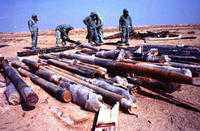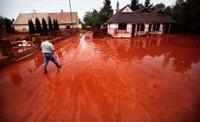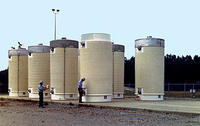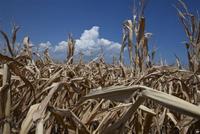-
Immediate, in-the-field identification of hazardous materials

Soldiers in war zones, and law enforcement and first responders on the scene will soon have the ability to collect and immediately analyze trace amounts of potentially dangerous chemical, explosive, or biological agents with the help of a surface swabbing device developed and prototyped by a Maine-based technology company with the help of the University of Maine researchers
-
-
New detection device for forensic and security applications
A new biological sampling and detection device could soon be used by first responders in the forensic and security sectors; the patented technology allows for rapid sampling of up to eight targets simultaneously, testing powder, liquids, or surfaces directly and has applications across the forensic and security areas
-
-
USDA’s proposed chicken safety inspection policy could mean trouble for consumers
The federal government has come up with a new proposal to examine chickens for contaminates and diseases, and the proposal has some people concerned and others outright scared; the proposal would reduce the number USDA food safety inspectors at poultry plants from four to one – and rely on plant’s employees to do safety inspections instead
-
-
Dropping lake levels in Michigan are a cause for concern
In a state that boasts 11,000 lakes, Michigan is going through a year long drought that has residents and businesses scrambling as water levels continue to decrease; the low waters is the result of low snowpack last winter and a hot dry summer this year
-
-
Improved disaster resilience is imperative for U.S: report
A new report from the National Academies says that it is essential for the United States to bolster resilience to natural and human-caused disasters, and that this will require complementary federal policies and locally driven actions that center on a national vision – a culture of resilience; improving resilience should be seen as a long-term process, but it can be coordinated around measurable short-term goals that will allow communities better to prepare and plan for, withstand, recover from, and adapt to adverse events
-
-
Extreme summer heat events, global warming linked: research

Since the late 1980s researches have been asserting that global warming would reach a point in the coming decades when its connection to extreme events would become more apparent; while some warming should coincide with a noticeable boost in extreme events, the natural variability in climate and weather can be so large as to disguise the trend; to distinguish the trend from natural variability, NASA researchers turned to statistics; the researchers did not focus on the causes of temperature change, analyzing instead surface temperature data
-
-
Canadian company offers the first treatment to neutralize red mud

Red mud is the most significant waste product of the traditional Bayer process for aluminum production; the industry produces more than 100 million tons of red mud a year, of which less than 5 percent is be reused; the rest is stored in ponds and reservoirs, posing serious environmental and economic risk; on 4 October 2010, for example, a flood of toxic red mud devastated Hungary after a retaining dyke ruptured, causing an ecological disaster; Canadian company Orbite Aluminae offers a technology to tackle the aluminum industry’s most serious problem
-
-
Forget blizzards and hurricanes, heat waves are deadliest

Tornadoes, blizzards, and hurricanes get most of our attention because their destructive power makes for imagery the media cannot ignore; for sheer killing power, however, heat waves do in far more people than even the most devastating hurricane; Hurricane Katrina and its floods, which devastated New Orleans and the Gulf Coast in 2005, exacted a death toll of 1,836 people; the heat wave which enveloped Europe during the course of three excruciating weeks in August 2003 of that year, killed an estimated 70,000 people
-
-
Bad news: avian influenza virus can now infect mammals
A novel avian influenza virus has acquired the ability to infect aquatic mammals and was responsible for an outbreak of fatal pneumonia that recently struck harbor seals in New England; any outbreak of disease in domestic animals or wildlife, while an immediate threat to wildlife conservation, must also be considered potentially hazardous to humans
-
-
Examination of Finnish lakes reveals radiation secrets
A new study casts doubt over the validity of models used to assess the impact of radiation on human health; an examination of the affects of radioactive fallout from the 1986 Chernobyl accident on two Finnish lakes sows that the transfer of the radioactive compounds is non-linear, and that the levels of radioactive compounds appear to be three times higher in fish-eating species (piscivores) than in non-fish-eating species
-
-
Surface coal mining destroying West Virginia streams, rivers
More than 22 percent of streams and rivers in southern West Virginia have been degraded to the point they may now qualify as impaired under state criteria; the substantial losses in aquatic insect biodiversity and increases in salinity is linked to sulfates and other pollutants in runoff from mines often located miles upstream
-
-
Science group: storing spent nuclear fuel in dry casks significantly safer then wet pools storage

An NRC report on the lessons of the Fukushima disaster says that storing spent nuclear fuel in wet pools is “adequate” to protect the public; a science groups says there is a significantly safer way to store the 55,000 tons of radioactive waste currently stored by the 104 nuclear power plants operating in the United States: transferring the spent fuel to dry casks
-
-
DARPA demonstrates quick vaccine development for hypothetical pandemic

A World Health Organization (WHO) estimates that between 20 and 50 percent of the world’s population will be affected if a pandemic were to emerge; WHO forecasts “it may be six to nine months before a vaccine for a pandemic virus strain becomes available”; DARPA reports that rapid fire test of novel, plant-based production method delivers more than ten million doses of H1N1 VLP influenza vaccine candidate in one month
-
-
Chronic 2000-4 U.S. drought, worst in 800 years, may be the "new normal"

The chronic drought that hit western North America from 2000 to 2004 left dying forests and depleted river basins in its wake and was the strongest in 800 years, scientists have concluded, but they say those conditions will become the “new normal” for most of the coming century
-
-
Deadly E. coli strain decoded
The secret to the deadly 2011 E. coli outbreak in Germany has been decoded; the deadliest E. coli outbreak ever, which caused fifty-four deaths and sickened more than 3,800 people, was traced to a particularly virulent strain that researchers had never seen in an outbreak before
-
More headlines
The long view
We Ran the C.D.C.: Kennedy Is Endangering Every American’s Health
Nine former leaders of the Centers for Disease Control and Prevention (CDC), who served as directors or acting directors under Republican and Democratic administrations, serving under presidents from Jimmy Carter to Donald Trrump, argue that HHS Secretary Roert F. Kennedy Jr. poses a clear and present danger to the health of Americans. He has placed anti-vaxxers and conspiracy theorists at top HHS positions, and he appears to be guided by a hostility to science and a belief in bizarre, unscientific approaches to public health.
